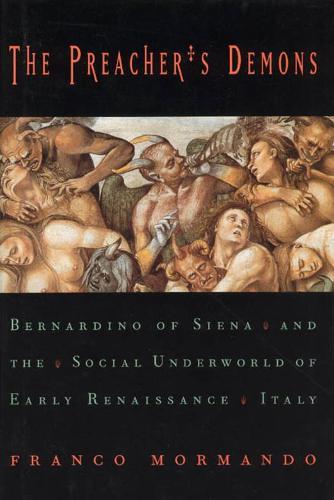Overview
""When the city was filled with these bonfires, he then combed the city, and whenever he received notice of some public sodomite, he had him immediately seized and thrown into the nearest bonfire at hand and had him burned immediately."" This story, of an anonymous individual who sought to cleanse medieval Paris, was part of a sermon delivered in Siena, Italy, in 1427. The speaker, the friar Bernardino (1380-1444), was one of the most important public figures of the time, and he spent forty years combing the towns of Italy, instructing, admonishing, and entertaining the crowds that gathered in prodigious numbers to hear his sermons. His story of the Parisian vigilante was a recommendation. Sexual deviants were the objects of relentless, unconditional persecution in Bernardino's sermons. Other targets of the preacher's venom were witches, Jews, and heretics. Mormando takes us into the social underworld of early Renaissance Italy to discover how one enormously influential figure helped to dramatically increase fear, hatred, and intolerance for those on society's margins. This book is the first on Bernardino to appear in thirty-five years, and the first ever to consider the preacher's inflammatory role in Renaissance social issues.
Full Product Details
Author: Franco Mormando
Publisher: The University of Chicago Press
Imprint: University of Chicago Press
Dimensions:
Width: 1.60cm
, Height: 0.30cm
, Length: 2.40cm
Weight: 0.737kg
ISBN: 9780226538549
ISBN 10: 0226538540
Pages: 380
Publication Date: 01 May 1999
Audience:
College/higher education
,
Professional and scholarly
,
Undergraduate
,
Postgraduate, Research & Scholarly
Format: Hardback
Publisher's Status: Active
Availability: Out of stock

The supplier is temporarily out of stock of this item. It will be ordered for you on backorder and shipped when it becomes available.
Reviews
Mormando's (Italian/Boston Coll.) survey of the 40-year preaching career of the Franciscan friar and Catholic saint Bernardino of Siena (1380-1444) is one of only a few book-length studies on this mouthpiece of medieval obscurantism. This book further dismantles the view of the early Italian Renaissance as an enlightened period, exposing the fundamental fears and insecurities of the Quattrocento (feminine magical power, paganism, the body and sexuality, and Christianity's inherent limitations) through the prism of Bernardino's sermons dealing with witchcraft, sodomites, and Jews. The friar's passionate call to denounce witches and burn them at the stake rests upon folklore beliefs that attribute to witches a number of grave sins, including infanticide, blood-sucking, and even fornication with the Devil. Bernardino was just as adamant about eradicating sodomy, by which he understood any sexual activity not leading to procreation. Passing on to Bernardino's third scapegoat, the Jews, Mormando runs into a problem. While he seeks to downplay somewhat the saint's notorious anti-Semitism, he advances unconvincing evidence. Indeed, the friar emerges here as a dyed-in-the-wool anti-Semite, who repeatedly referred to the Jews as the chief enemies of Christianity and proscribed any social or business contact between them and his followers. He also spoke in favor of isolating the Jews and ordering them to wear distinguishing badges. As for Bernardino's occasional adjurations to love the Jew with a general love, this was no more than lip service to an abstract principle of brotherly love and cannot 'attenuate his responsibility for spreading hostility toward Jews. Unfortunately, Mormando paints his picture of the Quattrocento exclusively though this preacher's eyes, without presenting the popular reaction to his message. Contrary to the book's professed goal, we learn more about the anxieties of Bernardino's tormented psyche and the intolerant streak in Catholicism than about the social underworld of early Renaissance Italy. (Kirkus Reviews)



